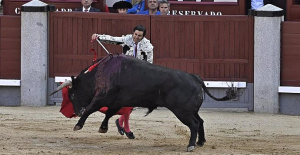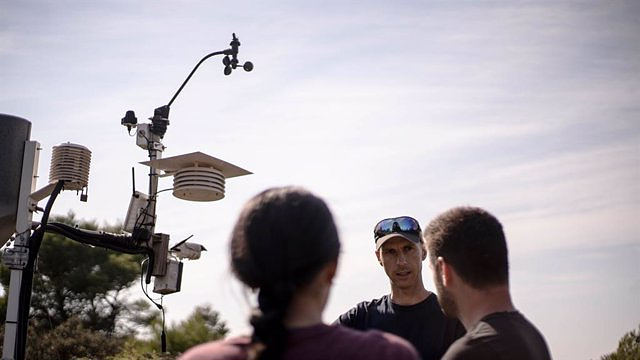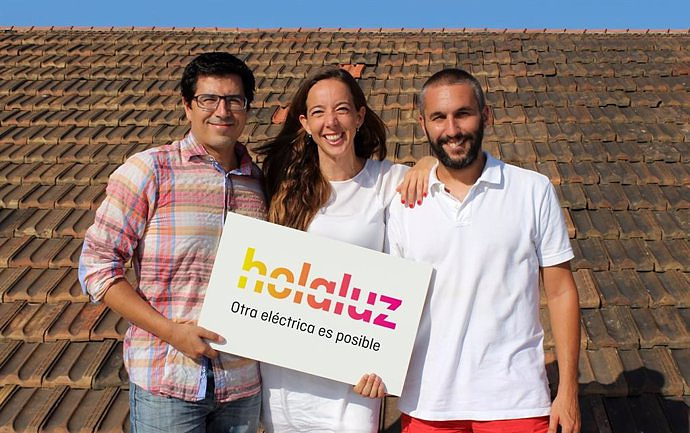VALENCIA, July 27 (EUROPA PRESS) -
The Center for Research on Desertification (CIDE) - a joint center of the Higher Council for Scientific Research (CSIC), the University of Valencia (UV) and the Generalitat Valenciana - has published a "pioneering" study to assess errors in measurement of the wind.
One of the main limitations in the study of climate change is the availability of quality data over time. This also happens for the wind speed, whose data depends on the proper functioning of the measurement sensors, specifically the anemometers. These instruments deteriorate and are replaced by others of better precision, which introduces an artificial error that alters the quantification of the changes in the wind.
This is precisely what a CIDE team is trying to quantify and correct, which has just published the first study that quantifies these errors from an official meteorological observatory.
This is CIDE's Climatoc-Lab, which leads pioneering research on the quantification of errors introduced by changes in anemometers in the climatic series of wind speed. In addition, it applies corrections so that wind measurements are robust over time, eliminating artificial noise introduced by measurement errors.
The article, published in July in the magazine 'Atmospheric Research' and in which researchers from the CSIC's Interdisciplinary Climate and Climate Services Thematic Platform have participated, shows a real case study of the impact of these changes on the historical series of velocity of the wind from the official meteorological observatory of San Sebastián-Igueldo, dependent on the State Meteorological Agency (Aemet).
For the person in charge of the work, the researcher member of the PTI Climate of the CSIC César Azorín, "the novelty of this study is the quantification of the impact of the changes of the anemometers on the measurements of wind speed from a real meteorological observatory. Previous studies had performed field and wind tunnel experiments under predefined conditions."
Thus, the CIDE team measured three factors: the change in the type of anemometer (SEAC model versus THIES); change in the height of its installation; and the age of both models.
"The results show a significant impact of these changes in the measurement of wind speed, whose errors were corrected to correctly estimate whether changes have occurred in surface winds," reveals César Azorín in a statement.
Specifically, the biases in the measurements of average wind speed and maximum gusts due to the performance of the most modern sensor, THIES, with respect to the old SEAC, represent an increase of around 4-5% with respect to the annual averages, according to the study data.
These errors also influence the estimates of other processes where wind speed plays a fundamental role, such as evapotranspiration and the availability of water resources, and wind energy, among others.
But the applications are multiple, from the design and manufacture of wind sensors to the use of these sensors in areas such as wind energy prospecting or civil engineering, since correctly measuring the wind load is a decisive factor in the construction of the structure, components and coating of buildings.
"Climate science bases its research on data from different sources, mainly from two: data observed in Earth observation systems such as weather stations or satellites, and data simulated from numerical models," argues the CSIC researcher.
"Although the advances in modeling are evident in the last decades, the data observed in meteorological stations represent reality and are the main basis for quantifying past climate changes. Therefore, the quantification of errors in meteorological observation and the Improving the quality of the climatic wind series are key to correctly estimating the changes in wind speed in recent decades," he concludes.
international comparative study
National meteorological services around the world and climate assessment groups will benefit from these findings, according to César Azorín, "since errors in wind speed measurements and maximum gusts can be minimized by implementing better observation protocols. Currently, CIDE's Climatoc-Lab is developing, in collaboration with the New Zealand National Institute for Water and Atmosphere Research (NIWA), a unique experiment in the world where various anemometers widely used by the different National Meteorological Services are compared to quantify deviations and differences in wind measurement between them.

 Exploring Cardano: Inner Workings and Advantages of this Cryptocurrency
Exploring Cardano: Inner Workings and Advantages of this Cryptocurrency Seville.- Economy.- Innova.- STSA inaugurates its new painting and sealing hangar in San Pablo, for 18 million
Seville.- Economy.- Innova.- STSA inaugurates its new painting and sealing hangar in San Pablo, for 18 million Innova.- More than 300 volunteers join the Andalucía Compromiso Digital network in one month to facilitate access to ICT
Innova.- More than 300 volunteers join the Andalucía Compromiso Digital network in one month to facilitate access to ICT Innova.-AMP.- Ayesa acquires 51% of Sadiel, which will create new technological engineering products and expand markets
Innova.-AMP.- Ayesa acquires 51% of Sadiel, which will create new technological engineering products and expand markets The Community will provide facilities and support to the Bullfighting Prize with the help of the Toro de Lidia Foundation
The Community will provide facilities and support to the Bullfighting Prize with the help of the Toro de Lidia Foundation Page will contact the bullfighting sector to create, from C-LM, Bullfighting Awards that will have national reach
Page will contact the bullfighting sector to create, from C-LM, Bullfighting Awards that will have national reach Urtasun, on eliminating the National Bullfighting Award: "The majority of Spaniards support the decision I have made"
Urtasun, on eliminating the National Bullfighting Award: "The majority of Spaniards support the decision I have made" Alfonso Guerra sees Sánchez in an "autocratic" drift and accuses him of generating division "between the two Spains"
Alfonso Guerra sees Sánchez in an "autocratic" drift and accuses him of generating division "between the two Spains" How Blockchain in being used to shape the future
How Blockchain in being used to shape the future Not just BTC and ETH: Here Are Some More Interesting Coins Worth Focusing on
Not just BTC and ETH: Here Are Some More Interesting Coins Worth Focusing on The Generalitat calls for aid worth 4 million to promote innovation projects in municipalities
The Generalitat calls for aid worth 4 million to promote innovation projects in municipalities UPV students design an app that helps improve the ventilation of homes in the face of high temperatures
UPV students design an app that helps improve the ventilation of homes in the face of high temperatures Ivace and promotes a less invasive device for the early detection of prostate cancer
Ivace and promotes a less invasive device for the early detection of prostate cancer Valencia unanimously approves the ordinance to allocate spaces to test innovative initiatives
Valencia unanimously approves the ordinance to allocate spaces to test innovative initiatives A million people demonstrate in France against Macron's pension reform
A million people demonstrate in France against Macron's pension reform Russia launches several missiles against "critical infrastructure" in the city of Zaporizhia
Russia launches several missiles against "critical infrastructure" in the city of Zaporizhia A "procession" remembers the dead of the Calabria shipwreck as bodies continue to wash up on the shore
A "procession" remembers the dead of the Calabria shipwreck as bodies continue to wash up on the shore Prison sentences handed down for three prominent Hong Kong pro-democracy activists
Prison sentences handed down for three prominent Hong Kong pro-democracy activists ETH continues to leave trading platforms, Ethereum balance on exchanges lowest in 3 years
ETH continues to leave trading platforms, Ethereum balance on exchanges lowest in 3 years Investors invest $450 million in Consensys, Ethereum incubator now valued at $7 billion
Investors invest $450 million in Consensys, Ethereum incubator now valued at $7 billion Alchemy Integrates Ethereum L2 Product Starknet to Enhance Web3 Scalability at a Price 100x Lower Than L1 Fees
Alchemy Integrates Ethereum L2 Product Starknet to Enhance Web3 Scalability at a Price 100x Lower Than L1 Fees Mining Report: Bitcoin's Electricity Consumption Declines by 25% in Q1 2022
Mining Report: Bitcoin's Electricity Consumption Declines by 25% in Q1 2022 Oil-to-Bitcoin Mining Firm Crusoe Energy Systems Raised $505 Million
Oil-to-Bitcoin Mining Firm Crusoe Energy Systems Raised $505 Million Microbt reveals the latest Bitcoin mining rigs -- Machines produce up to 126 TH/s with custom 5nm chip design
Microbt reveals the latest Bitcoin mining rigs -- Machines produce up to 126 TH/s with custom 5nm chip design Bitcoin's Mining Difficulty Hits a Lifetime High, With More Than 90% of BTC Supply Issued
Bitcoin's Mining Difficulty Hits a Lifetime High, With More Than 90% of BTC Supply Issued The Biggest Movers are Near, EOS, and RUNE during Friday's Selloff
The Biggest Movers are Near, EOS, and RUNE during Friday's Selloff Global Markets Spooked by a Hawkish Fed and Covid, Stocks and Crypto Gain After Musk Buys Twitter
Global Markets Spooked by a Hawkish Fed and Covid, Stocks and Crypto Gain After Musk Buys Twitter Bitso to offset carbon emissions from the Trading Platform's ERC20, ETH, and BTC Transactions
Bitso to offset carbon emissions from the Trading Platform's ERC20, ETH, and BTC Transactions Draftkings Announces 2022 College Hoops NFT Selection for March Madness
Draftkings Announces 2022 College Hoops NFT Selection for March Madness























